Save the Date for the presentation of the Baltic Sea Library at the Leipzig Book Fair:
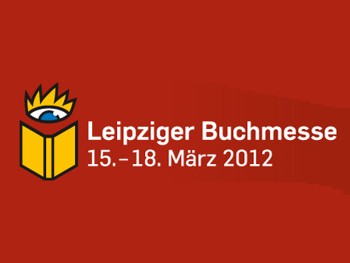 15th March, 2012
15th March, 2012
12:00 - 12:30 pm.
Presentation: Klaus-Jürgen Liedtke & Imre Török, chairman of the German Writers’ Union
„Virtuell durch die Ostsee - Präsentation der Baltic Sea Library
Im dritten Jahr ihres Bestehens weitet sich die virtuelle Ostseebibliothek mehr und mehr zu einem literarischen Echoraum, einer Plattform, von der aus sich das gemeinsame kulturelle Erbe rund um die Ostsee erschließt.
Zwölf Herausgeber für finnische, schwedische, dänische, norwegische, isländische, russische, estnische, lettische, litauische, polnische und deutsche Literatur sowie Texte auf Latein haben sich länderübergreifend zusammengetan, um Wesen und Einflüssen der Literatur nachzuspüren.
Die Literatur zu sammeln, zu übersetzen und Leserinnen und Lesern online zur Verfügung zu stellen, geschieht dabei in dem Bewusstsein, dass es weder eine gemeinsame Literatur noch Sprache gibt. Und doch ist das umfangreiche Projekt ein vielsprachiges Statement, um das Verbindende der OstseeKultur vor Augen zu führen.“
Veranstalter: Baltic Sea Library, Finnland-Institut in Deutschland
Ort: Nordisches Forum, Halle 4, Stand D302
Please have a look at the new site on facebook as well - which we hope you “like” or will share with friends who might.
BSL ON THE ROAD
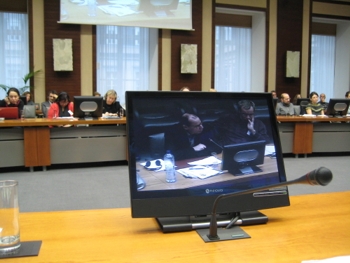
EU commissioner for culture and education Mr. Vladimir Šucha talked about language barriers as a challenge to develop our creativity as translators and about the need for thrilling tasks in order to outmanage the market mechanisms. Concrete self-administered projects can promote these skills to use our copyrights in new digital formats.
In a letter to the BSL after the congress Mr. Šucha invites us to prepare a multi-annual cooperation project and apply for EU funds on 1st October.
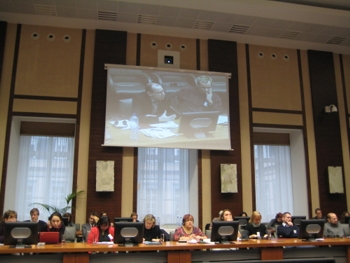
The BBTT stands for a group of scholars, librarians and officials within the Bibliotheca Baltica association who meet with the purpose of supporting the economic, social and cultural development of the Baltic Sea region libraries. One important idea behind the Think Tank is to promote the awareness of "Digital Europe" and boost the information society building process in the Baltic Sea region. It is quite obvious how the BSL contribute to this process by maintaining a library that is entirely confined to the screen and yet brings together so many people and languages, opening up new ways for research and learning.
One question raised in Vilnius was if we should add Yiddish to our languages and it showed that the National Library of Finland holds collections by the Helsinki Synagogue including collections from former Vilnius Jewish congregation.
Looking back without anger
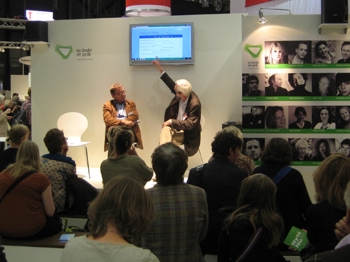 Since we held our Berlin conference in the beginning of April on “Cultural Diversity, language and Digital Content”, there has been a meeting on 23rd August in Stockholm at the Council of Baltic Sea States Secretariat (wonderfully situated in the Old Town, facing all the cruise ships entering Stockholm) with Jan Lundin, General Secetary, and Senior Adviser Nanna Magnadóttir from CBSS as our hosts and Gunnar Sahlin, chairman of Bibliotheca Baltica, Lars Kleberg, prof em from Södertörn University, and me as participants. We discussed further possibilities of cooperation. Talks with the German Ambassador for the CBSS will follow at the German Foreign Office on 28th October.
Since we held our Berlin conference in the beginning of April on “Cultural Diversity, language and Digital Content”, there has been a meeting on 23rd August in Stockholm at the Council of Baltic Sea States Secretariat (wonderfully situated in the Old Town, facing all the cruise ships entering Stockholm) with Jan Lundin, General Secetary, and Senior Adviser Nanna Magnadóttir from CBSS as our hosts and Gunnar Sahlin, chairman of Bibliotheca Baltica, Lars Kleberg, prof em from Södertörn University, and me as participants. We discussed further possibilities of cooperation. Talks with the German Ambassador for the CBSS will follow at the German Foreign Office on 28th October.
The work goes on
Dear friends, our project’s main sponsor, Nordic Culture Point, has accepted the interim report about our work and will soon transfer new financial means. Thus, it is high time to make plans about our future proceedings. The “shelfs” of the library need to be filled with more texts! That’s why all editors are invited to propose three up to six new texts to be included in the Baltic Sea Library - the sooner the better. But the target line should be October 15. Your ideas are of prime importance not only for the completion of the library but also for planned translation workshops that we are going to organize together with Goethe-Institut in spring 2012 (which texts/which authors could be subject of translation?)
More news: the German translator Jürgen Rennert proposes to include in the Baltic Sea Library also Yiddish texts, namely those of the Jewish authors Ber Halpern (Vilnius) and Mark Rasumny (Riga). What is your opinion on that? A question here seems to be how Hebrew script can be digitized (PDF files?). The German translator Walter Neumann proposes poems by Janis Rainis claiming that his work is one of the greatest enrichments of the Latvian language, the Latvian “Goethe” so to say. But, is there “Balticness” to be found? The Norwegian author and translator Erling Kittelsen has proposed to include Latvian dainas. But also with dainas it might be complicated to relate them to the Baltic Sea. What do you think? Let’s discuss these items! Your opinions are welcome.
Cooperation
after a meeting in Potsdam arranged by the German-Russian Forum, I can gladly tell you that we have received an offer to cooperate in all what we need from Russia by Ms Ekaterina Genieva, Director General from the State Libray of Foreign Literature in Moscow.
We should just put up a list about which of our texts that are needed in Russian and we will get the help in research and scanning. So do not hesitate!
I also would like to add some more information about the research done by Olga Kurilo who sent us a blog post recently:
*BÄDERKULTUR: Am weißen Strand von Selenogradsk*
Die Osteuropa-Historikerin Olga Kurilo stellt in der Urania ihr Buch
"Zoppot, Cranz, Rigascher Strand" vor
*POTSDAM / INNENSTADT* - Eben noch hatten die Besucher interessiert
vor den reich bebilderten Tafeln der Ausstellung über "Zoppot, Cranz,
Rigascher Strand" gestanden. Doch kaum hatte die in Moskau geborene
Osteuropa-Historikerin Olga Kurilo den Vortragsraum der Urania betreten,
war es mit der Beschaulichkeit auch schon vorbei. Die quirlige, an der
Viadrina Frankfurt (Oder) arbeitende Russin schien so übervoll von ihrem
Thema "Bäderkultur an der Ostsee als transnationales Phänomen", dass sie
gar nicht wusste, wovon sie zuerst erzählen sollte.
Am Anfang ihrer Forschungen stand die Beschäftigung mit Ausländern und
speziell deutschen Protestanten in Russland. Als sie später einen
Lehrauftrag an der Universität Greifswald erhielt, hat sie sich dort mit
dem Thema "Ostseebad" infiziert und auf einer Tagung über Ostseebäder
erste Kontakte hergestellt. So entstand in Zusammenarbeit mit dem
Deutschen Kulturforum Östliches Europa Potsdam und dem Herder-Institut
Marburg die Ausstellung, die eine im deutschsprachigen Kulturraum der
Ostsee bis weit in das Baltikum ähnliche Bäderkultur reflektiert. Für
Zoppot, Cranz und Rigaer Strand entschied sich Kurilo, weil sie jeweils
als ausgelagerte Badestrände der Großstädte Danzig, Königsberg und Riga
fungierten, die alle einen deutsch geprägten kulturellen Hintergrund
hatten, dann kommunistisch wurden und seit den Umbrüchen den Anschluss
an eine gemeinsame Kultur des Ostseeraums suchen.
Kurilos Vortrag begann mit der medizinisch motivierten Einrichtung von
Seebädern, die im ältesten deutschen Ostseebad Heiligendamm bereits 1793
begann. Es folgten Travemünde (1800), Kolberg (1802), Cranz (1816),
Zoppot (1821) und etwa zeitgleich auch das zu Russland gehörende Dubbeln
(1814) am Rigaschen Strand (heute Jürmala Lettland). Mit Dokumenten und
Fotos belegte Korilo die nahezu deckungsgleiche Entstehungsgeschichte,
die fast immer mit der Anbindung an den Eisenbahnverkehr einherging. Mit
den Bäderbahnen aber wurde aus dem elitären Vergnügen der Eliten
Massentourismus.
Nach 1945 wurde aus Cranz bei Königsberg Selenogradsk bei Kaliningrad
und Zoppot (Sopot) kam endgültig zu Polen. Auch der Rigasche Strand von
Jürmala hat mehrfach die Staatszugehörigkeit gewechselt, bevor nach 1990
aus der einstigen Sowjetrepublik das EU-Mitglied Lettland wurde.
Es scheint, dass dem politischen Umbruch eine Renaissance der
Bäderkultur folgen könnte. Es wäre wünschenswert, wenn die Träume der
Menschen in Orten wie Selenogradsk dabei nicht baden gehen müssten.
* Olga Kurilo: "Zoppot, Cranz, Rigascher Strand", Be-Bra-Verlag
2011, 157 Seiten, 19 Euro. Ausstellung in der Gutenbergstraße
71/72 bis Anfang September.
(Von Lothar Krone)
MÄRKISCHE ALLGEMEINE 9.6.2011
http://www.maerkischeallgemeine.de/cms/beitrag/12103309/60709/Die-Osteuropa-Historikerin-Olga-Kurilo-stellt-in-der.html
Survey
Danish Literature:
1. H. C. Andersen, “Den lille havfru”. Fairy Tale (The Little Mermaid, 1837)
2. Karen Blixen, “Vinter-Eventyr” (1942)
3. Martin Andersen Nexø, Tale from Bornholm
Estonian Literature:
1. Friedebert Tuglas, “Noorusmälestused” (Memoirs of Youth: A chapter about Å land, 1940)
2. Aino Pervik, “Kunksmoor. Kunksmoor ja kapten Trumm” (Old Mother Kunks: A chapter about an oil disaster on sea, 1973)
3. Jüri Tuulik, “Tellikaatne”. Short story (“A Delicate Matter”), from the collection of short stories and recipes “Räim, pisike kena kala” (Baltic Herring, a Nice Little Fish, 2008)
Finnish Literature:
1. Aino Kallas, “Lasnamäen valkea laiva”. Short story (from the collection “Lähtevien laivojen kaupunki”, 1913)
2. Pentti Saarikoski, Helsinki-poems (from the collection “Kuljen missä kuljen”, 1965)
3. Volter Kilpi, “Alastalon salissa”. Novel (Chapter XIII: Albatrossi, 1933)
German Literature:
1. Thomas Mann, „Buddenbrooks. Verfall einer Familie“. Novel (Chapters 8- 9, 1901)
2. Simon Dach, 3 selected poems (arias)
2a Treue Lieb’ ist jederzeit / zu gehorsamen bereit ;
Anke von Tharau (in Lower German and translation by Herder), 1642
2b Gesang… (auf Opitz), Der Mensch hat nichts so eigen, 1640
2c Perstet amicitiae semper venerabile Faedus! 1640
3. Theodor Fontane, „Effi Briest“. Novel (Chapters placed in Kessin on the Baltic Sea, 1895)
Icelandic Literature:
1. Ólafs saga Tryggvasonar (in: Heimskringla, around 1230)
2. Egils saga Skallagrímssonar (written between early 13th century and 1400. Chapter 46, the “Baltic” chapter)
3. Bragi Ólafsson, “Sendiherrann”. Novel (The Ambassador, 2006. Chapter about the Druskininkai Festival in Lithuania)
Latvian literature
1. Livonijas Indriķa hronika (Chronicle of Henry of Livonia, Heinrici Cronicon Lyvoniae), chronicle/poem, around 1227. The opening poem and selected paragraphs mentioning territories of Estonia, Lithuania, Germany, Sweden, Russia).
2. Alberts Bels, Cilvēki laivās (Men in boats), novel, 1987, selected chapters.
3. Roalds Dobrovenskis, Magnus, dāņu princis (Magnus, prince of Denmark) novel, 2004, selected chapters.
Lithuanian Literarure:
1. Kristijonas Donelaitis, „Pavasario linksmybės“ (Kristijonas Donelaitis, „Funs of Spring“, a fragment from the poem „The Seasons“, 1765–1775, publ. 1818 in German)
2. Sigitas Geda, „Angelas krintantis Palangoj“. Poem (“Angel Falling in Palanga“, 1984)
3. Sigitas Geda, „Gyvenimas su loke“. Poem (“A Life With The Bear”)
Norwegian Literature:
1. Knut Hamsun,” Landstrykere” (The Wayfarers), novel, 1927 (Chapter where the main character, August, is telling an adventurous story about
his days as a sailor and a shipwreck in the Baltic)
2. Dag Solstad, “Ellevte roman, bok atten”. (“Eleventh novel, book eighteen“), novel, 1992, chapter about Vilnius, where the main character, Bjorn Hansen, pays a Lithuanian surgeon 10 000 dollars to define him as paralysed, which he is not, and place him in a wheelchair for the rest of his life
3. Two travelogues:
3a Knut Hamsun, “I Æventyrland” (In Wonderland). Travel letters (three opening pages of the first chapter from St. Petersburg) 1903
3b Tor Eystein Øverås, “ Til – en litterær reise” (Towards – a Literary Journey), 2005, the eight opening pages, outlining the project of making a baltic journey, and why he wants to make it
Polish Literature:
1. Stefan Chwin, “Hanemann“. Novel (“Trzciny”, chapter about the shooting of Danzig by the Red Army, 1995)
2. Pawel Huelle, “Winniczki, kałuże, deszcz“. Short story (“Snails, puddles, rain”, from the collection of short stories about Gdansk, 1996)
3. Jarosław Iwaskiewicz, “Petersburg”, essay, Warsaw, 1976
Russian Literature:
1. Alexander Pushkin, “The Bronze Horseman”. Poem («Медный всадник», pronounced as [´Medniy ´Vsadnik]). 1834
2. Mikhail Lermontov, “The Sail”. Poem («Парус», pronounced as [´Pa:rus]). 1832
3. Anna Akhmatova, 6 selected poems (1940 to 1964): Ptitsy smerti v zenite stojat… (The birds of death are at the zenith…), S Novym godom! S novym gorem! (Happy New Year! Welcome new grief!), Primorsky park Pobedy (Primorsky Victory Park), Primorsky sonet (Sea shore sonnet), Zapad klevetal i sam zhe veril…(The West cast asperses and held them true…), V Vyborge (In Vyborg)
Swedish Literature:
1. Tomas Tranströmer, “Östersjöar” Poems (“Baltics”, 1974).
2. Selma Lagerlöf, “Nils Holgerssons underbara resa genom Sverige“ (Chapter 14 Two towns: Vineta and Visby, 1906)
3. Tove Jansson, “Sommarboken” (Chapter “Sophias storm”, 1972)
Let me begin by saying that the technical difficulties involved in launching the website have proved greater than expected, especially the digitising itself, purchasing the rights to publish these texts if they are still under copyright law and the cooperation with the technicians working in the database, who, it seems, speak a language that is very much their own.
Nevertheless, we have made some progress in the case of Finnish, German and Russian texts and have received news that most of the Norwegian texts are on their way. As far as Swedish literature is concerned, we have received permission to publish Tomas Tranströmers “Baltics” and are working on the commentaries. We are also trying to get hold of the translations into other languages―since this is a text that has actually already been translated into most of our languages (although not into Russian). It is also for this reason that we decided to use a line from this poem to introduce our website.
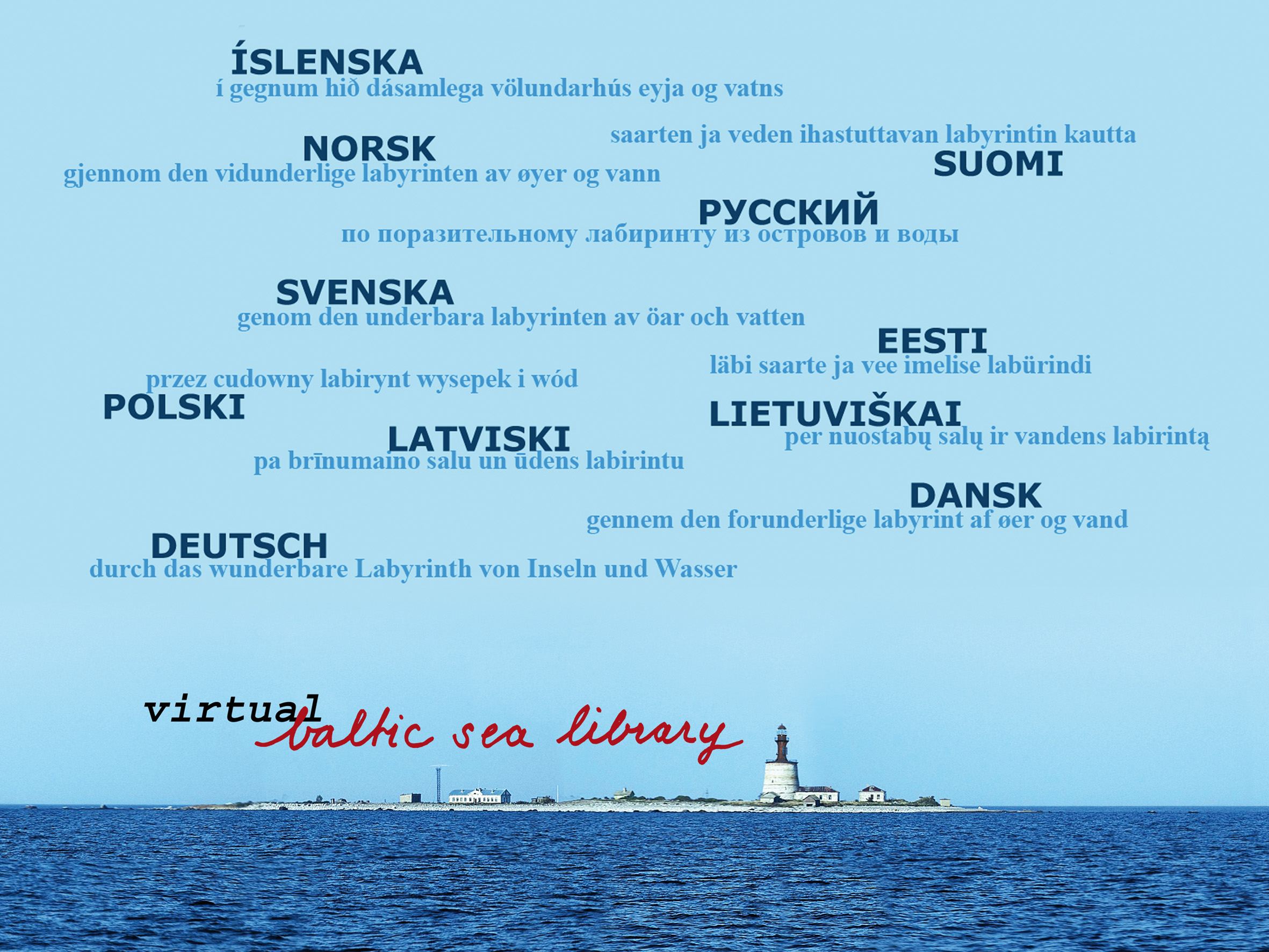 Because Selma Lagerlöf died in 1940, we will not be allowed to publish her “Two towns” before January 1, 2011. In the case of Tove Jansson, we have been denied the right to use her chapter on the website by her estate. The same applies to Thomas Mann’s “Buddenbrooks”, because Fischer Verlag of Frankfurt retains the rights and has denied any online use of the text.
Because Selma Lagerlöf died in 1940, we will not be allowed to publish her “Two towns” before January 1, 2011. In the case of Tove Jansson, we have been denied the right to use her chapter on the website by her estate. The same applies to Thomas Mann’s “Buddenbrooks”, because Fischer Verlag of Frankfurt retains the rights and has denied any online use of the text.When it comes to Icelandic literature, digitising has been completed but not yet the proof-reading. So a good deal of work remains to be done, as is the case with texts from Danish, Polish, Lithuanian, Latvian and Estonian literature. Financial restrictions mean we do not want to spend the money for this until the end of the year!
Major questions currently facing the project are: how to proceed with new proposals, with research into translations of the chosen texts, and with cooperative ventures with the libraries of the Baltic Sea region.
One very positive aspect resulting from my recent presentation of the project at the Waltic conference in Istanbul was an offer to produce a new translation of an Old Swedish text that has not yet been published: the life story of Agneta Horn, the granddaughter of Axel Oxenstierna, who was painted by David Klöcker: http://en.wikipedia.org/wiki/File:AgnetaHorn.jpg
Agneta Horn’s story is a true Baltic tale dating back to the seventeenth century, She was born in Riga, grew up in Finland and Sweden and followed her husband to the battlefields of northern Germany. Published for the first time in 1908, this autobiography is eminently suitable for publication in contemporary Swedish, as it is considered to be the first Swedish novel. The original title is: Beskrifning öfver min elända och mycket vedervärtiga vandringes tid samt alla mina mycket stora olyckor och hjärtans hårda sorger och vedervärtighet som mig därunder hopetals har mött alltifrån min första barndom och huru Gud alltid har hulpit mig med ett godt tålamod igenom gå alla mina vedervärtigheter.
Meanwhile I have been invited to speak at the Bibliotheca Baltica symposium in Helsinki 21-22 October, both at the conference itself (see the programme: http://bbsymposium2010.nationallibrary.fi/programme/) and at a reception given by the National Library of Finland.
I think this will provide a good opportunity to stress what we have in common and to invite librarians from all around the Baltic to participate in our work, especially with research into translations of the works we have chosen. Gunnar Sahlin, the chairman of Bibliotheca Baltica, has written to me and said that he wants to intensify our cooperation.
I will stay on in Helsinki for the Book Fair and hand out information about our portal, postcards and flyers to the visitors.
Concerning the homepage, we still have to include the essays based on presentations given in Visby in 2002 and that were dropped when we changed address. However, it still needs to be decided whether they should be included in the database. If so, we would need a thorough survey of which locations are included in them.
In the coming year we will be able to offer 12 scholarships for translators of our texts at the International Writers and Translators’ House in Ventspils, Latvia. We still need to decide on the criteria for selection. I look forward to receiving your proposals and comments and your suggestions as to how we should proceed with the project up until the end of this year!
kjl
Page 8 of 9
